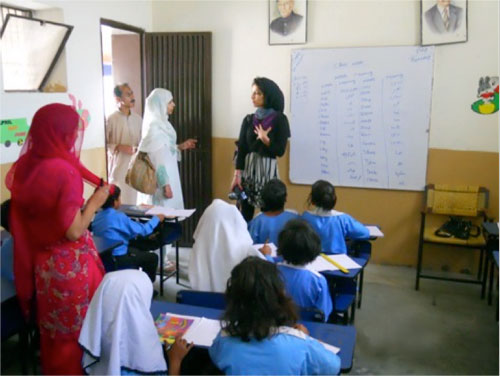Essay by Khadeeja Syeda Safdar
Why this "Bug Queen" Became a Writer
Nothing in my past indicates an impulse to write.
During first grade, I even forgot how to speak English after an extended stay in my birth country of Pakistan. Although my parents tell me I relearned it quickly, my language skills lagged for a year.
Teachers described me as spacey, aloof, lost in another world.
 In the second grade, I was known as the “Bug Queen.” I would run around the playground with a plastic cup collecting ladybugs. (My parents make fun of my insect obsession to this day.) I’d spend recess alone collecting ants for the ant farm I had constructed for our classroom.
In the second grade, I was known as the “Bug Queen.” I would run around the playground with a plastic cup collecting ladybugs. (My parents make fun of my insect obsession to this day.) I’d spend recess alone collecting ants for the ant farm I had constructed for our classroom.
I found insects more fascinating than immunizing myself from cooties—an infectious disease afflicted on the “uncool.”
Later, I became a math nerd in the most all-encompassing sense of the word. I was well known for my ability to perform computations in my head. As a sixth grader, I was too excited about qualifying for my school’s competitive math team to realize I was probably committing social suicide by joining the geeks who congregated on the weekend to solve algebra equations.
Yet, if I was ever slighted, bullied, or picked on as a child, I never noticed. People rarely interested me.
I didn’t see a need for writing until high school. Even then, I didn’t write for the sake of writing; I did it to speak. I attended a debate competition in ninth grade on a teacher’s recommendation, because she said it would be good preparation for college.
The experience was terrible. I felt nervous and uncomfortable; I couldn’t keep track of what I was trying to say. I mumbled what should have been a twenty-second introduction for at least a minute, concluding my speech without providing a single argument.
None of my fellow representatives asked any questions, probably out of pity. On the ride home, I received my score: 1 out of a possible 6.
Still, my pride forced me to attend the next event. I began writing out my speeches and reading them verbatim. It was ridiculous to read papers at a speech competition—I felt like I was hitting with a plastic bat in the major leagues. Nonetheless, I learned to articulate my thoughts. I became strangely comfortable standing in front of a group. And suddenly, I became interested in the world, in people, in what they had to say.
I sat glued to my desk, impressed by the talent of the other speakers. The arguments they presented, even if they weren’t quite viable, seemed ingenious after hearing their speeches. These debate issues—ranging from capping medical malpractice suits to the need for the death penalty—contrasted sharply with the abstract math problems I was accustomed to. The arguments tugged on my mind in a new way. There weren’t any black-and-white answers; each side depended on the circumstances of human lives.
When a judge told me my arguments had him sold, I felt profoundly satisfied. By the end of that year, I’d racked up trophies, and I no longer needed to write my speeches. I could speak off the cuff with ease. My language skills improved. I joined my high school newspaper; I ended up majoring in philosophy and political science in college.
I was writing.
But so far I’ve related how I came to write, not why I do it now—and the why is what makes me a writer. More than anything, I write to engage with other people. I write because it keeps me out of ant piles. I write because I can’t do everything in my own head. I write because I’ve realized that communicating ideas matters more than esoteric visions I can’t describe to anyone else.
During my last trip to Pakistan in 2011, I worked on a story about girls going to nonprofit schools in developing countries. The story was for a journalism class, and I ended up writing about Maria, the eight-year-old daughter of a house servant in Pakistan. Maria copied math problems from the textbooks of older children during recess at her primary school, because she couldn’t afford to buy books of her own.
I was so inspired by Maria’s drive that I told her parents I’d pay for her to attend middle school. Months have passed since I wrote Maria’s story, but I’m still in touch with her. She saves up a couple of rupees at a time to call me in America every month and to update me on her progress. Her phone calls remind me to be grateful for the opportunities I’ve had, for the schools I’ve attended, and for the books I’ve read.
And for the gift of writing.
The act of writing forces me to make the abstract concrete and then more concrete and then even more concrete. Sometimes it’s painful. But it seems to work. I do it because concrete things are more easily shared with others. I finally know what it feels like when someone “gets” me, and I like the feeling.
Now, when I’m excited about a new idea or experience, I feel an overwhelming sense of loneliness until I write it down. Writing it gives me the hope that someone somewhere might read it—and understand.
Art Information
- “Ladybug” © Christophe Libert; stock photo
- Khadeeja with Education Coordinator Rabia Batool at Eno Bhatti Formal School, Pakistan (March 2011) © Khadeeja Syeda Safdar; used by permission
 Born in Lahore, Pakistan, Khadeeja Syeda Safdar is currently a writer based in New York City. She studied political science and philosophy at Columbia University and journalism at Harvard University. This piece began as a "Why I Write" essay in Martha Nichols's magazine writing course at the Harvard Extension School.
Born in Lahore, Pakistan, Khadeeja Syeda Safdar is currently a writer based in New York City. She studied political science and philosophy at Columbia University and journalism at Harvard University. This piece began as a "Why I Write" essay in Martha Nichols's magazine writing course at the Harvard Extension School.
During her free time, Khadeeja enjoys nothing more than getting lost in new places, chatting with strangers, and snapping photographs of anything and everything along the way.
She blogs at the right words, where she posts excerpts from literary works that speak to her (by Mary Oliver, Joan Didion, and many others). Sometimes, her quotes get re-blogged. About a year ago, one stranger left this note:
“I check this every day now, and it truly inspires me to better myself and embrace those seemingly ‘insignificant’ moments that we often force ourselves to forget.”

